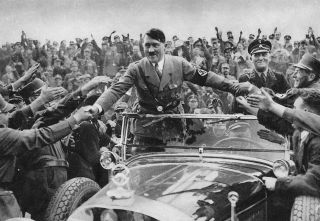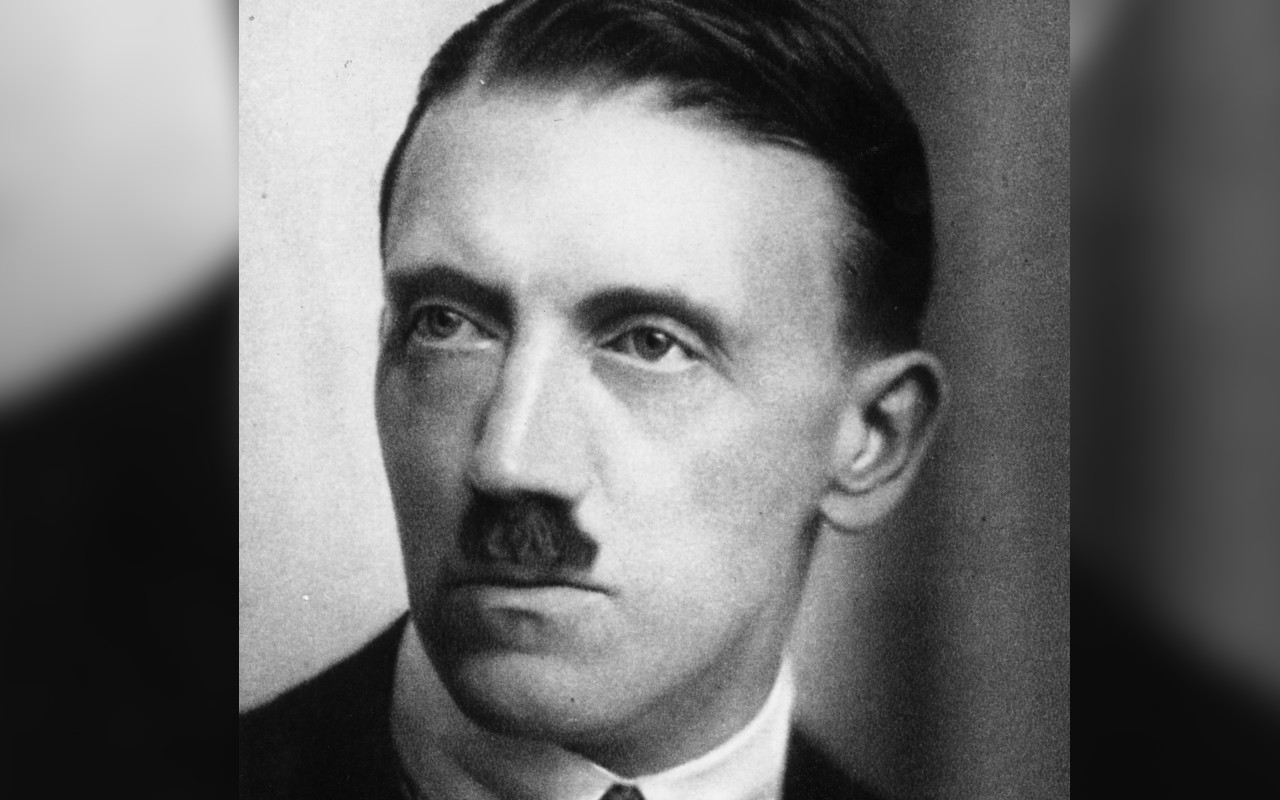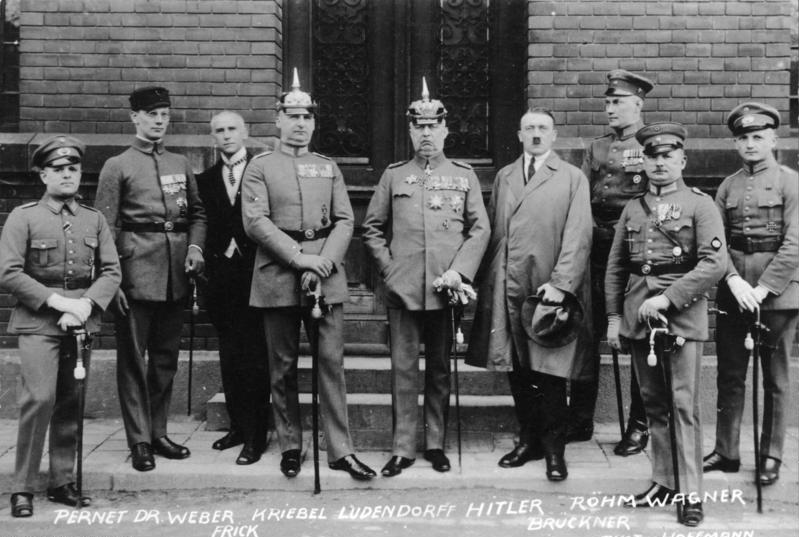What Was Adolf Hitlers Slogan Actually Make Germany Great Again
How Adolf Hitler rose to power

Adolf Hitler was the unremarkable artist who rose to become the dictator of Germany and the instigator of the Holocaust. Given the devastation left in Hitler'south wake, a major question for historians of the 20th century has been how Hitler captured the German imagination and came to power.
He was non, as a person, a charismatic character; biographer Ian Kershaw described him as an "empty vessel outside his political life." He had few genuine friends, an overinflated view of his own intellect and no inborn connections to propel him to the acme.
Nor did Hitler have especially original ideas; the German Workers' Political party he joined in 1919, which would go the Nazi Party under his leadership, was merely one of approximately 70 correct-wing groups in Federal republic of germany after Globe War I, Kershaw wrote in the biography "Hitler: 1889-1936 Hubris" (W.W. Norton & Company, 1998).
Simply in the chaos of mail-World War I Germany, it was Hitler's group that would gain dominance — and that was not a matter of luck, said Karl Schleunes, author of "The Twisted Road to Auschwitz: Nazi Policy Toward German Jews, 1933-39" (University of Illinois Printing, 1970).
"What makes the German Workers' Party different from the other 69 groups is that they don't have a Hitler, whose speaker talent and tactics are really quite constructive," Schleunes said.
And in one case he achieved fame, Hitler was able to cover upwardly his rather off-putting personality with media images of a cultured gentleman beloved by children and animals.
The early years

Hitler's early life does non hint at his hereafter. The son of a low-level civil servant in Republic of austria, Hitler was groomed by his harsh, authoritarian father to get a bureaucrat as well. Other than the beatings from his father, the future dictator's early childhood was relatively normal, but he became sullen and friendless in adolescence, according to Kershaw'due south biography. He never finished loftier school and, from 1905 to 1907, sponged off of his female parent.
In 1907, Hitler famously failed to win admission to art school, kicking off a menstruum in which he lived in Vienna, making grand pronouncements about art, architecture and culture, merely rarely making whatever serious effort to secure a future in art himself. In 1909, he ended upwards living for a time in a flophouse for the homeless. He soon turned to supporting himself by selling cheap paintings of urban center scenes.
In 1913, Hitler went to Munich, fleeing Austrian authorities who'd noticed that he'd dodged mandatory military service there. It was in the German military, however, that Hitler would find direction — and a springboard into politics.
Service in World State of war I gave Hitler a identify in the world for the first fourth dimension, Kershaw wrote, fifty-fifty as many of his fellow soldiers viewed him as a bit of a socially awkward oddball and prude. Federal republic of germany admitted defeat in the war equally Hitler rested in a hospital, recovering from a mustard gas assail. He returned to his regiment in Munich, Schleunes said, where he ultimately got a job with the information unit of measurement, working in armed services intelligence.
Information technology was this job that put him on a standoff course with the German Workers' Party. Hitler had long held correct-wing nationalist views, but in a "critical development," Schleunes said, the army sent him to attend university lectures on German history, socialism and bolshevism — from a right-wing perspective.
In particular, Hitler ate up the words of a right-wing economist, Gottfried Feder, and a right-fly historian, Karl Alexander von Müller. It was Müller who noticed that Hitler had a talent for rhetoric, and his recommendations helped Hitler state a chore in the intelligence unit as a spy keeping tabs on the High german Workers' Political party, Schleunes said.
Gaining power
It was Hitler's ability as a speaker that turned him from informer to party member, Schleunes said. During a German Workers' Party lecture, someone suggested that it might be all-time for Bavaria to break from the rest of Germany, splintering the state. Hitler, a German nationalist, was appalled and argued against the idea. The leader of the party, impressed with his speaking style, asked him to bring together the party. A few days later, on Sept. 12, 1919, Hitler became the 55th member of the party, with the full permission of the ground forces.
Hitler became a fiery speaker on the beer-hall circuit and was willing to risk the humiliation of low turnout past organizing rallies in large spaces, Kershaw wrote. His organizing talents propelled him to the top of the party's leadership.
In 1920, Hitler and the other leaders of the party changed its proper name from the German Workers' Party to the National Socialist German Workers' Party (Nationalsozialistische Deutsche Arbeiterpartei, or "Nazi" for short). In 1921, Hitler was voted chairman of the party and took total control. The once-tiny grouping began to draw new members, absorbing other right-wing groups, Schleunes said.
Hitler remained a cold presence in person. "He's non an interesting conversationalist," Schleunes said. "He's really sort of a dull person, except when he appears before an audience, when somehow, a switch is turned on. He could milk an audience and shape information technology and get it to feel."
If Hitler'southward speaking abilities gave him the roots to flourish in the early Nazi Party, the anarchy and resentment of Frg at the time were the soil that made his growth possible.The German people were in shock subsequently losing Earth War I, Schleunes said. They'd been told throughout the war that they were winning. They faced nutrient and coal shortages, and ended the state of war with millions killed and wounded. Just these sacrifices were necessary, according to the army, because victory was close.
"They're told that for four years, and suddenly, they're told that 'Nosotros lost the war,'" Schleunes said. To understand how such a thing could happen, many turned to conspiracy theories — particularly, the theory that Jewish people on the home front had stabbed Germany in the dorsum. "The situation, for someone like Hitler, is ripe," Schleunes said.
A wider popularity

Violence marked Hitler's early rise. By 1923, he was emboldened enough to attempt to overthrow the government of Bavaria past forcefulness, which he hoped would eventually pb to the overthrow of the national government in Berlin.
This "Beer Hall Putsch" failed, but there was widespread sympathy for Hitler'due south aims, Schleunes said. His trial became a megaphone dissemination his ideas, and his light ix-month stint in prison gave him the opportunity to dictate the "most unreadable" but wildly popular biography "Mein Kampf," Schleunes said.
"Hitler was smart enough to realize later on the failure of his "Beer Hall Putsch" that he and his political party could not come to power with violence confronting the institutions of the state, especially the army and the police," said Dr Benjamin Hett, writer of "The Death of Democracy: Hitler's Rise to Power and the Downfall of the Weimar Republic" (Henry Holt and Co, 2018). "They could only come to ability past getting within the system, and the path to that was through winning elections".
In that location were many factors that led to Hitler'southward more widespread acceptance in Federal republic of germany, from economic depression to the land'south hatred of the Treaty of Versailles that ended Earth State of war I. But Hitler managed to aggrandize his entreatment from the beer-soaked halls of Munich to the remainder of the state, in part via the mass media.
In 1932, he ran for president and struggled to reach centre-class voters, said Despina Stratigakos, a historian of architecture and the writer of "Hitler at Home" (Yale Academy Press, 2015). To rehabilitate his personal image, he focused on his domestic portrayal. Instead of downplaying his transient, rather alone personal history, Hitler and his propaganda team started to foreground his personal life.

"He'south beingness presented as a good human being, a moral homo, and the evidence for that comes from his private life," Stratigakos told Live Scientific discipline. "Information technology's fabricated, only information technology's very constructive."
Hitler lost the 1932 election, merely gained the support of many influential industrial interests. When the parliamentary elections failed to establish a majority authorities, Germany's president Paul von Hindenburg caved to outside pressure and named Hitler chancellor (the role of chancellor in Federal republic of germany is like to that of Prime Minister in other parliamentary systems, and Germany had both a president elected by the people and a chancellor representing the majority party in the government).
In 1933, the Reichstag building was fix on fire, which Hitler used as a pretext to seize emergency powers and detain his political enemies. With communists and other leftists under arrest, he was able to push a police force chosen the Enabling Act through parliament. The Enabling Act allowed Hitler's cabinet to constitute legislation without parliamentary consent.
With the backing of the conservative German National People'southward Party (DNVP) and with the left-leaning Social Democratic Party of Germany (SPD) barred from attention the vote on 24 March 1933, Hitler's proposal was passed past 444 votes to 94, a central step in usurping the democratic institutions of the land.
"In the wake of this law came what the Nazis called 'Gleichschaltung', or coordination, a process in which whatsoever organization at all that could peradventure form the basis of opposition was abolished or taken over by the Nazis," said Hett. "This process was largely completed by July of 1933, when all political parties except the Nazis were formally outlawed."
As Hitler strong-armed his way to dictatorship, profiles of him rusticating in his residence in Obersalzberg, Bavaria, portrayed him as a cultured gentleman, love past dogs and children. Working with the builder Gerdy Troost, Hitler created a space with an expansive Great Hall that seemed inspired past the artist salons of pre-Globe State of war I Munich, Stratigakos said. High german and English language magazines printed fluffy pieces on the Führer at domicile.
"Fifty-fifty the American Dog Kennel Gazette had this feature on Hitler as a dog lover," Stratigakos said. These cozy, domestic scenes helped soften the image of the Hitler. The strategy was so successful that the virtually-sold images of 1934 were pictures of Hitler at home playing with his dogs or with children.
Through his arrangement, oratory and public relations, Hitler "the nonentity, the mediocrity, the failure," equally Kershaw chosen him, had go not merely the chancellor of Federal republic of germany, but a beloved glory. The transformation was complete.
Boosted resources
To read more about the life and rise of Hitler, you can visit The National WWII Museum website. Additionally, you tin can watch this TED Talk video by Alex Gendler and Anthony Hazard.
Bibliography
- "Hitler: 1889-1936 Hubris" (W.W. Norton & Company, 1998)
- "The Twisted Route to Auschwitz: Nazi Policy Toward German Jews, 1933-39" (University of Illinois Press, 1970).
- "The Death of Commonwealth: Hitler's Rise to Power and the Downfall of the Weimar Republic" (Henry Holt and Co, 2018).
- "Hitler at Home" (Yale Academy Printing, 2015)
Source: https://www.livescience.com/54441-how-hitler-rose-to-power.html
0 Response to "What Was Adolf Hitlers Slogan Actually Make Germany Great Again"
Post a Comment